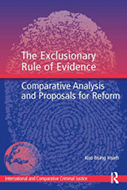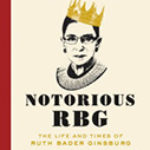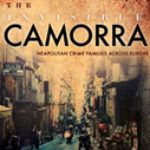The Exclusionary Rule of Evidence: Comparative Analysis and Proposals for Reform

Author: Kuo-hsing Hsieh
Publisher: Farnham, Surrey, UK: Ashgate (Routledge), 2014. 250 p.
Reviewer: Andrew Novak | May 2016
Dr. Kuo-hsing Hsieh of National Chung Cheng University in Taiwan presents an interesting comparative study of the exclusionary rule in the United States, United Kingdom, and People’s Republic of China. The book explores the philosophical rationale for the exclusionary rule and its evolution in the Anglo-American world, particularly noting the deterrence potential of excluding relevant evidence obtained by unlawful search and seizure or confessions extracted by torture. Hsieh is an absolutist and emphasizes throughout the book a slippery slope argument: exceptions to the exclusionary rule would eventually swallow the rule itself. I think this premise is convincing. The book’s primary case study is the People’s Republic of China, where an exclusionary rule is not enforced in practice and, at least anecdotally, confessions extracted by torture are not uncommon. Because China emphasizes crime control and uses inquisitorial civil procedure, defendants have an obligation to tell the truth and to cooperate with law enforcement. Defendants have precious little recourse to challenge the state since they carry the burden of showing that their confessions were extracted by torture, force, or threats, an almost impossible task in many cases.
In confronting objections to the exclusionary rule and arguments in favor of exceptions, Hsieh repeatedly falls back on his strict rationale in favor of exclusion and the deterrence rationale. His support of the exclusionary rule is written at a fairly high level of abstraction. What the book does not attempt to do is craft a limited exclusionary rule that would be palatable to China’s ruling regime in practice. Rather, the book takes an all-or-nothing approach and falls back ona philosophical argument to counter real-world and practical arguments against a broad exclusionary rule. I agree with this premise, though the discussion is somewhat repetitive. I am not sure that the exclusionary rules for confessions produced by torture and for unlawfully seized evidence are necessarily comparable in practice, or at least they seem to have different foundations. The book therefore alternates between two rather distinct discussions. In addition, I am quite curious about the case of Taiwan, which Hsieh mentions only in passing. Taiwan’s exclusionary rule was enacted recently and is relatively limited in scope. Taiwan would seem at least as instructive to the China case as the experiences of the United States and United Kingdom.
These quibbles aside, the book’s development of the philosophical rationale of the exclusionary rule is comprehensive and convincing. China is an understudied case, and one that attracts global interest. Most interesting is Hsieh’s description of the gap between the letter of the law and the law’s enforcement at the local level. Although the Supreme People’s Court has banned the use of torture in extracting confessions, for instance, this mandate has by no means eradicated torture from the legal system. Hsieh’s work gave me a far better understanding of the origins of the exclusionary rule and the real-world implications of adopting a strict rule in practice.
Andrew Novak is an adjunct professor of criminology, law, and society at George Mason University


